InterSystems and Cognetivity partner up to support dementia detection tool
- 17 May 2021

InterSystems is partnering up with Cognetivity to support its solution that uses AI to detect dementia up to 15 years earlier than conventional methods.
Cognetivity uses InterSystems’ IRIS for Health, to power its Integrated Cognitive Assessment (ICA), which tests how the brain reacts to certain types of images.
Conducted on an Apple iPad tablet, the Cognetivity ICA detects the earliest signs of disease before the onset of memory symptoms. The tool has already deployed at North Staffordshire Combined Healthcare NHS Trust and is currently the subject of a UK government-funded study in collaboration with the Sussex Partnership NHS Trust and Alzheimer’s Research UK.
InterSystems’ IRIS for Health will facilitate the integration of the Cognetivity ICA platform with healthcare data systems, ensuring that critical information gets to the right person at the right time.
Jonathan El-Sharkawy, chief technology officer at Cognetivity, said: “The unique data management and integration capabilities of InterSystems IRIS platform are essential to what we do.
“They give us the interoperability and agility our cutting-edge technology requires to help transform dementia care pathways right across the NHS and to meet the accelerating demand for telemedicine and remote tools.”
The cloud-based InterSystems IRIS for Health data platform is specifically engineered to extract value from healthcare data and has full compliance with mandatory data standards, such as HL7 V2 and Fast Health Interoperability Standards (FHIR) in the NHS.
Chris Norton, managing director for UK & Ireland at InterSystems, added: “We’re immensely proud to work in partnership with such an innovative company as Cognetivity which is using our advanced data capabilities in the battle against the scourge of dementia.
“This is a partnership that will trigger a revolution in diagnosis and care for millions of people. The pandemic has demonstrated the need for scalable innovation that cuts across conventional boundaries to provide remote early detection tools that reduce cost and risk while improving outcomes for individual patients.”



